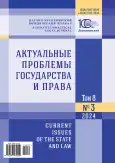Intellectual property of educational organizations in the context of digitalization: problems of regulation and law enforcement
- Authors: ZOLOTOVA V.B.1
-
Affiliations:
- Russian State Academy of Intellectual Property
- Issue: Vol 8, No 3 (2024)
- Pages: 399-407
- Section: Материальное право
- URL: https://journal-vniispk.ru/2587-9340/article/view/303397
- ID: 303397
Cite item
Abstract
The development of digital technologies has predetermined a new vector in the formation of intellectual property of educational organizations, which entailed the need to establish a balance, which, on the one hand, should ensure the effective achievement of the goals set by the legislator in terms of the effectiveness of educational services provision and, on the other hand, ensure the economic stability of their existence. The novelty of the problem is directly expressed in the frameworkof the digital space formation, which determines the processes of gradually occurring commercialization of education and the growing need to protect the intellectual activity results. The purpose of the study is to identify and establish the characteristic features of intellectual property in educational organizations in the context of digitalization, as well as to determine the foundations of legislative regulation of the public relations in question and the enforcement of relevant norms. The methodological basis of the study is formed by general scientific methods (analysis, synthesis, deduction, induction, comparison) in combination with special methods of a legal nature (formal legal and comparative legal methods, method of law interpretation). The results of the work consist in the established aspects that determine the progressive introduction and development of technological capabilities in educational activities, including increasing the level of openness of educational materials through their placement in accessible online and educational resources, as well as the need to improve legislative norms in terms of commercialization and protection of intellectual rights.
About the authors
Valeriya B. ZOLOTOVA
Russian State Academy of Intellectual Property
Author for correspondence.
Email: v.zolotova@rgiis.ru
ORCID iD: 0009-0003-7872-2281
Post-Graduate Student, Acting Dean, Head of the International Center for Advanced Training and Retraining of the Additional Education Faculty
Russian Federation, 55a Miklukho-Maklaya St., Moscow, 117279, Russian FederationReferences
- Kocherga S.Yu. (2020). Prospects for the mechanism of legalizing the sale of exclusive rights to the results of their work by developers from universities and research institutes. Vestnik ekspertnogo soveta, no. 4 (23), pp. 79-83. (In Russ.) https://elibrary.ru/bhjcrp
- Shcherbak E.N. (2023). On the issue of legal regulation of rights to the results of intellectual activity in educational organizations. Pravovoi al’manakh = Legislative Almanac, no. 8 (30), pp. 12-17. (In Russ.) https://elibrary.ru/dmewlj
- Pustyl’nik M.L., Vlasova Yu.Yu. (2017). About intellectual property management and innovation administration in scientific and educational institutions of humanitarian profile. Otechestvennaya i zarubezhnaya pedagogika, vol. 1, no. 1 (35), pp. 142-159. (In Russ.) https://elibrary.ru/ygsywz
- Agamagomedova S.A., Nad’kina N.A. (2019). Development of the institution of intellectual property in the conditions of digitalization of the economy. Izvestiya vysshikh uchebnykh zavedenii. Povolzhskii region. Ekonomicheskie nauki = University Proceedings. Volga Region. Economic Sciences, no. 1 (9), pp. 4-16. (In Russ.) https://doi.org/10.21685/2309-2874-2019-1-1, https://elibrary.ru/kgbvyx
- Sviridova E.A. (2019). Legal aspects of the commercialization of results of intellectual activity carried out by educational budgetary organizations. Ekonomika. Nalogi. Pravo = Economics, Taxes & Law, no. 1, pp. 152-163. (In Russ.) https://doi.org/10.26794/1999-849X-2019-12-1-152-163, https://elibrary.ru/yzcmwl
- Nikolaev A.S., Kirillov N.N. (2022). Activities of domestic HEIs in the development of the innovation-based economy and technology transfer market. Teoriya i praktika obshchestvennogo razvitiya = Theory and Practice of Social Development, no. 6, pp. 94-100. (In Russ.) https://doi.org/10.24158/tipor.2022.6.14, https://elibrary.ru/tabzlp
- Titova O.V., Leboshkina O.O. (2018). Features of functioning of labor market in modern conditions. Tsentral’nyi nauchnyi vestnik = Central Science Bulletin, no. 11 (52), pp. 95-96. (In Russ.) https://elibrary.ru/xrrenv
- Pluzhenskaya L.V. (2015). Features of the innovative activity management in the educational institution. Yaroslavskii pedagogicheskii vestnik = Yaroslavl Pedagogical Bulletin, no. 6, pp. 20-24. (In Russ.) https://elibrary.ru/tjzape
- Kolesnikova Yu.S., Sitdikova R.I., Starostina E.S., Sitdikov R.B. (2022). Intellectual property management of a classical university. Vestnik ekonomiki, prava i sotsiologii = The Review of Economy, The Law and Sociology, no. 3, pp. 11-14. (In Russ.) https://elibrary.ru/hqjeeq
- Solomonenko L.A. (2013). Problems related to the legal regulation of a work made for hire at university. Internet-zhurnal «Naukovedenie» = Internet-journal “Naukovedenie”, no. 6 (19), pp. 1-9. (In Russ.) https://elibrary.ru/sakqxr
- Rozhkov M.A. (ed.). (2023). Intellectual Rights in the Digital Age: Selected Aspects. Moscow, GAUGN Press, 438 p. (In Russ.) https://doi.org/10.18254/S6049894-5-6, https://elibrary.ru/kmmnpu
- Kolodeznikova S.I., Platonova R.I. (2017). Implementing the results of intellectual activity at the university. Vestnik Severo-Vostochnogo federal’nogo universiteta imeni M.K. Ammosova. Seriya: Pedagogika. Psikhologiya. Filosofiya = Bulletin of the North-East Federal University named after M.K. Ammosov. Pedagogy. Psychology. Philosophy, no. 4 (08), pp. 69-73. (In Russ.) https://elibrary.ru/zxwbun
- Chekha V.V. (2021). Digital platforms as new subjects in education. Nauka i shkola = Science and School, no. 3, pp. 81-93. (In Russ.) https://doi.org/10.31862/1819-463X-2021-3-81-93, https://elibrary.ru/walmtx
- Din S. (2020). Digital platforms as a new form of development of relationships between buyers and producers in the context of the digital economy. Al’manakh mirovoi nauki, no. 2 (38), pp. 75-80. (In Russ.) https://elibrary.ru/fmtygn
- Dokukina I.A., Polyanin A.V. (2020). Organization of decentralized management based on digital platforms distributed registry. Estestvenno-gumanitarnye issledovaniya = Natural-Humanitarian Studies, no. 27 (1), pp. 76-81. (In Russ.) https://doi.org/10.24411/2309-4788-2020-00015, https://elibrary.ru/mthrca
Supplementary files








